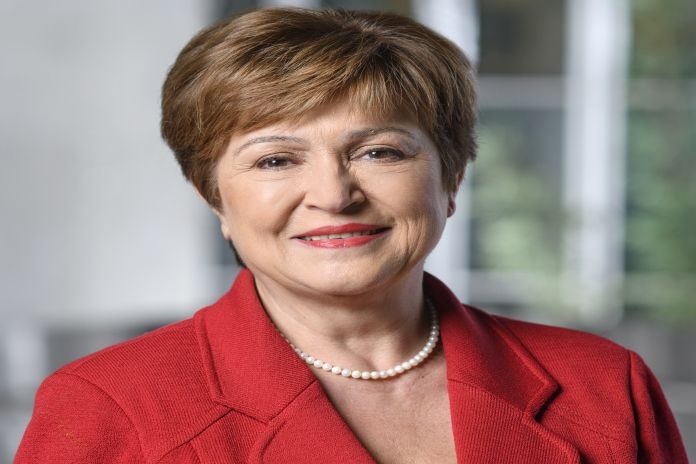DAVOS, Switzerland – In a moment, you will hear from our chief economist, Gita Gopinath, who will walk us through the World Economic Outlook Update. But first, I want to give a brief overview:
Let me start with the good news: after a synchronized slowdown in 2019, we expect a moderate pickup in global growth this year and next.
We already see tentative signs of stabilization, with recent data suggesting that trade and industrial output are bottoming out. But we have not yet reached a turning point. Moreover, we are revising slightly downwards our October projections for 2019, 2020 and 2021. And Gita will give you the numbers as well the explanation for this slight downward revision.
The reality is that global growth remains sluggish, which makes it harder for countries to boost incomes and living standards.
Above all, we are all adjusting to the new normal of high uncertainty: yes, the “phase one” agreement between the US and China is good news, but the underlying causes of trade tensions and the fundamental issues of trade reform are still with us. In the first weeks of the new year, we have witnessed increased geopolitical tensions in the Middle East, and we have seen the dramatic impact of climate shocks in Australia and parts of Africa.
So, here is our main message: while in October we were able to sum up our economic forecast in two words—“synchronized slowdown”—we now have four words: “ Tentative Stabilization, Sluggish Recovery.”
Three New Year’s resolutions
We are now well into January, but it’s not too late for New Year’s resolutions. So, what is our advice to policymakers? What could be their resolutions for the new year?
First—keep doing what works. The fact is that monetary easing added an estimated 0.5 percentage point to global growth last year. There were 71 rate cuts by 49 central banks as part of the most synchronized monetary easing since the global financial crisis. Just imagine: without this contribution from monetary policy, we would have technically been talking about recession—but we did not; we avoided that.
However, we all recognize that monetary policy cannot be the only way for countries to boost growth. And we have already seen some countries using fiscal measures where space is available.
Second—focus on boosting resilience and potential growth. For many countries, this means using fiscal tools more systematically and stepping up economic and financial reforms: from lowering barriers to entry in service sectors to balancing the benefits and risks of fintech.
Enhancing resilience also means using macroprudential tools where financial vulnerabilities are building up while using financial policies to help reduce economic inequality. Most importantly, all countries need to build resilience to climate risks; and they can seize the opportunities that come with the transformation to a low-carbon economy.
Third—be ready to act if growth slows again. This means keeping well-planned fiscal measures in your back pocket—projects that can quickly get off the ground. And if risks do materialize, countries may need to act together by launching a coordinated fiscal response.
New year, new decade
Of course, these are not just resolutions for this year; they will affect our way forward in the new decade. How can we manage rapid change and avoid the mistakes of the past?
In some ways, the beginning of the 2020s is eerily reminiscent of the 1920s think of high economic inequality, the rapid spread of new technologies, and the huge risks and rewards of finance. All these issues require stronger cooperation within and across nations.
As Leo Tolstoy once put it: “ All the variety, all the charm, all the beauty of life is made up of light and shadow.”
By working together now and in the decade ahead, we can bring more light and dispel the shadows. May that be our New Year’s resolution for all of us.
With that, let me turn it over to Gita and her deputy, Gian Maria.





